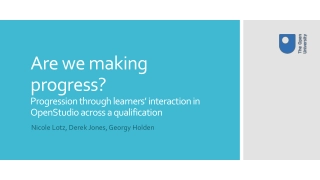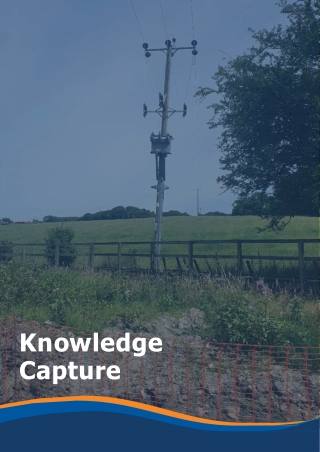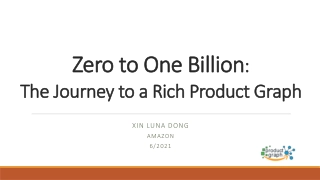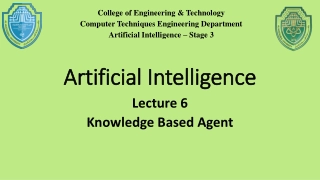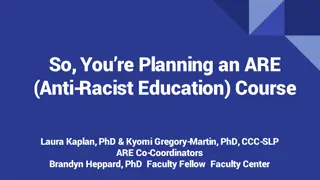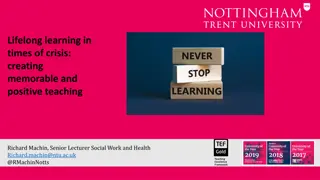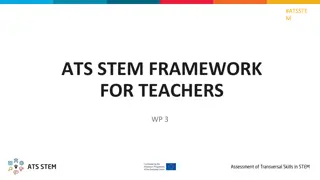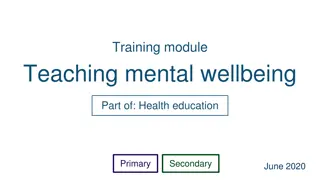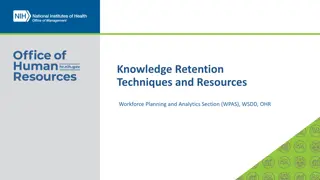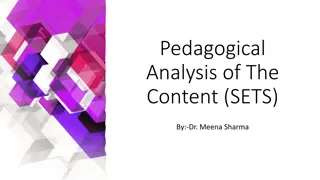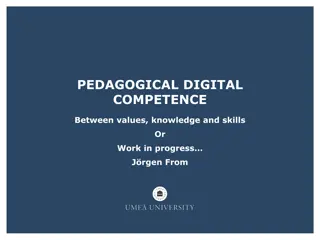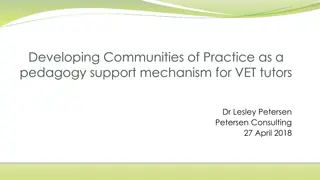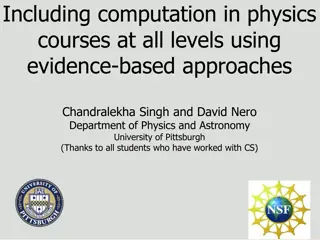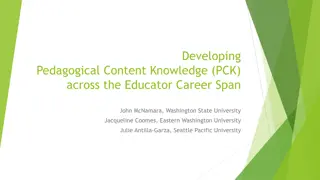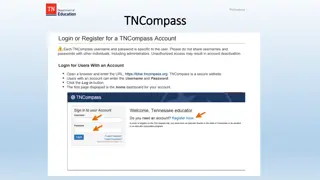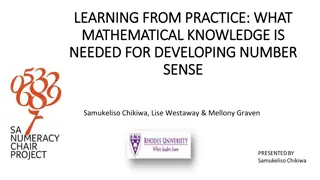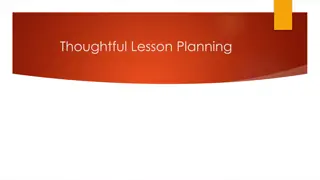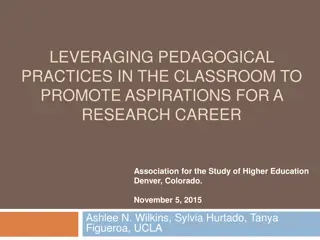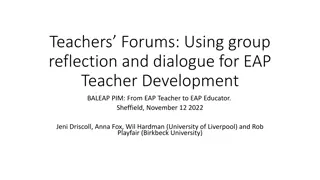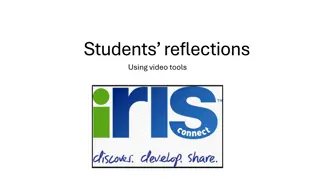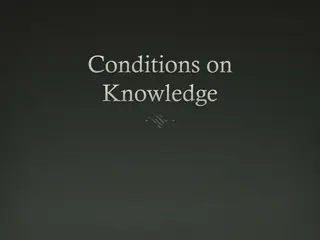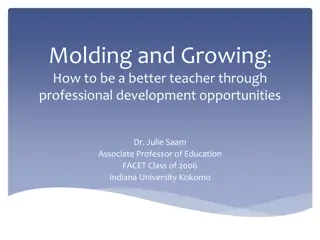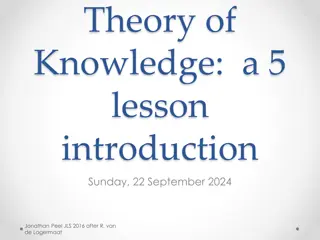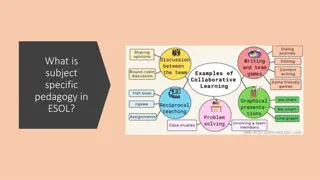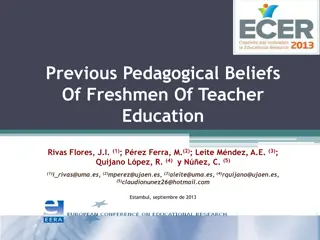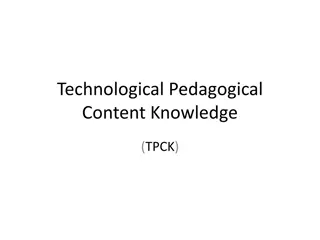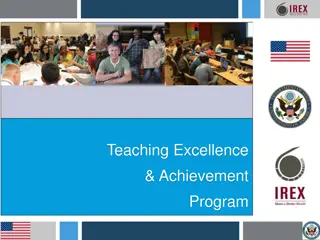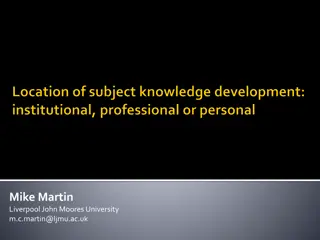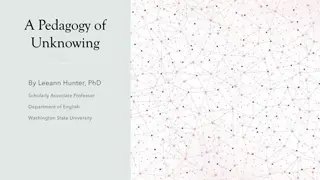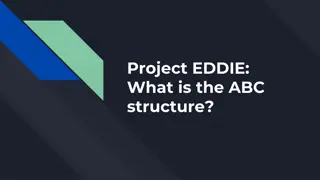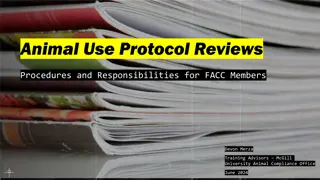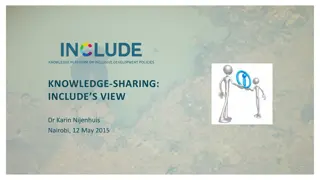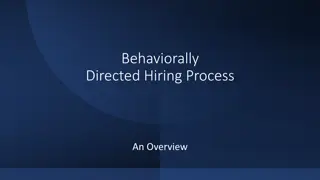Are we making progress?
The progression of learners in OpenStudio across a qualification through interactions and activities. The project aims to understand how engagement, communication, collaboration, knowledge, and learning skills evolve. The agenda includes discussions on traditional studio progression, factors influen
0 views • 24 slides
Knowledge Capture
Knowledge capture is crucial for organizations to retain valuable expertise and prevent loss of critical knowledge due to employee turnover. Tacit and explicit knowledge play key roles, requiring strategic planning for retention, incentivizing knowledge-sharing culture, and implementing effective st
0 views • 6 slides
Exploring Product and Knowledge Graphs for Enhanced Information Retrieval
Dive into the world of product and knowledge graphs, uncovering the journey to a rich product graph, examples of knowledge graphs for songs, and the mission to provide comprehensive information on products and related knowledge. Discover use cases ranging from information provision to enhancing sear
3 views • 76 slides
Understanding Knowledge-Based Agents in Artificial Intelligence
Knowledge-Based Agents in AI utilize logic and knowledge representation to accept tasks, learn, and adapt to changing environments. Logic plays a crucial role in forming complex world representations and deriving actions based on inference. The central component is the Knowledge Base (KB), represent
4 views • 19 slides
Understanding Knowledge Management: Processes and Frameworks 2. In knowledge management, organizations create, share, and manage knowledge to enhance performance. It involves acquiring different types of knowledge through various means, such as perc
Knowledge Management, Organizational Objectives, Types of Knowledge, Tacit Knowledge, Explicit Knowledge
1 views • 17 slides
Understanding Anti-Racist Education: A Comprehensive Overview
This content provides insights into Anti-Racist Education (ARE), discussing its essence, what it is not, and its pedagogical considerations. It delves into the importance of fighting systematic racism, embracing student identities, and creating inclusive classroom environments to engage meaningfully
6 views • 26 slides
Creating Resilient Graduates: Pedagogical Model for Lifelong Learning in Times of Crisis
In times of instability, educators must help students understand societal events, build resilience, skills, and emotional intelligence. This presentation by Richard Machin outlines a pedagogical model focusing on professional experience, research, and lived experience to prepare graduates for challe
1 views • 9 slides
Reimagining Blended Learning: Making Space for Transformation
Blended learning faces challenges such as overcrowded campuses and exhausted staff but can evolve through active, pedagogical spaces, stakeholder communication, and staff-student partnerships. The solution lies in creating spaces for care, reflection, experimentation, and dialogue to explore new ped
0 views • 6 slides
Pedagogical Shift in Physical Science: Constructing Knowledge Through Learner-Centered Experiences
There is a significant pedagogical shift in physical science education from viewing science as a fixed body of knowledge to emphasizing the process of constructing knowledge. Learners are now placed at the center stage, engaging in inquiry-based learning, critical thinking, and collaborative interac
3 views • 21 slides
A Comprehensive Overview of ATS STEM Framework for Teachers
Explore the ATS STEM framework for teachers, focusing on key principles like problem-solving design, disciplinary knowledge, and integrated STEM practices. Discover how to incorporate transversal competencies and formative assessments into STEM education, supported by real-world contexts and appropr
0 views • 76 slides
Pathways to Community Engagement in Higher Education: A Comprehensive Overview
Exploring the core value of engagement in universities of the 21st century, this content delves into various pathways like institutional, pedagogical, and epistemological that contribute to community interaction and knowledge production.
0 views • 43 slides
Teaching Mental Wellbeing in Health Education: Training Module Overview
This training module provides valuable insights into teaching mental wellbeing as part of health education in primary and secondary schools. It covers the new curriculum requirements, examples of good practices, and activities for trainers. Schools are encouraged to adapt the module according to the
3 views • 62 slides
Effective Knowledge Retention Strategies in Workforce Planning and Analytics
Retaining knowledge is crucial for organizations to enhance customer service, foster innovation, improve efficiency, and bridge skill gaps. This article explores the significance of knowledge retention, the types of knowledge essential for succession planning, and two effective strategies - the Know
1 views • 10 slides
Pedagogical Analysis of Sets in Mathematics: Key Concepts and Teaching Strategies
Explore the pedagogical analysis of SETS by Dr. Meena Sharma, focusing on major concepts like the meaning of SET, SET notation, classification of SETS, and fundamental operations. Understand minor topics such as examples of sets, SET notation methods, and types of SETS. Objectives include defining S
0 views • 8 slides
Exploring Pedagogical Digital Competence in Education
Education is evolving in the digital age, requiring teachers to develop Pedagogical Digital Competence (PDC) to enhance student learning. PDC involves applying attitudes, knowledge, and skills to plan, conduct, evaluate, and revise ICT-supported teaching effectively. It operates at three levels - mi
0 views • 9 slides
Enhancing Pedagogical Development Through Community of Practice
The research project led by Dr. Lesley Petersen of Petersen Consulting focuses on investigating the effectiveness of a Community of Practice (CoP) in developing pedagogical practices of foundation education tutors in the VET context. Utilizing participative action research and peer mentoring partner
0 views • 13 slides
Enhancing Computation in Physics Education Using Cognitive Approaches
Utilizing evidence-based methods, this study explores incorporating computation in physics courses, focusing on instructional design, student knowledge states, and preparation for future learning. It discusses common conceptual difficulties in quantum mechanics and proposes cognitive theory-based st
0 views • 24 slides
Developing Pedagogical Content Knowledge (PCK) for Educator Excellence
Explore how Developing Pedagogical Content Knowledge (PCK) throughout an educator's career enhances student learning and growth. Learn strategies to integrate content knowledge, pedagogy, and socio-emotional learning effectively. Discover the progression of teacher development from recruitment to le
2 views • 29 slides
Exploring Transliteracy and Pedagogical Models in Digital Learning Environments
This content delves into the concepts of transliteracy and pedagogical models, emphasizing the importance of mapping meaning across various media in digital learning. It discusses the interconnectedness of text literacy, visual literacy, and digital literacy, highlighting the social uses of technolo
0 views • 15 slides
Professional Development Renewal Guidelines for Educators
Educators in Tennessee must earn professional development points to advance or renew their teaching licenses. This involves accruing specific numbers of PDPs through relevant activities related to content and pedagogical knowledge. The guidelines outline the requirements and restrictions, emphasizin
0 views • 16 slides
Developing Mathematical Knowledge for Teaching in South Africa
Mathematics education in South Africa faces challenges due to insufficient Mathematical Knowledge for Teaching (MKfT) among teachers. Research highlights the need for teachers to possess both subject matter knowledge and pedagogical content knowledge to effectively teach mathematics. Identifying and
0 views • 17 slides
Enhancing Geography Lessons Through Thoughtful Planning
Thoughtful lesson planning in geography education is essential for creating quality learning experiences. Student teachers need to merge subject knowledge with pedagogical skills to develop effective lesson plans that consider individual learners' needs. Challenges arise when lesson planning focuses
0 views • 14 slides
Promoting STEM Research Career Aspirations Through Pedagogical Practices
This study explores the impact of pedagogical practices in introductory STEM courses on students' aspirations towards research careers. It investigates the differences in effects on Underrepresented Racial Minority (URM) students and non-URM students, as well as variations in experiences within thes
0 views • 13 slides
Enhancing EAP Teacher Development Through Teachers Forums and Group Reflection
Explore the use of Teachers Forums for EAP Teacher Development, providing a space for peer support, feedback, and discussions on pedagogical practices. Learn how these forums promote collaboration, shared experiences, and continuous professional growth among educators. Gain insights from reflections
0 views • 15 slides
Enhancing Pedagogical Competencies Through Video Reflection in Education
Exploring the use of video tools for student reflections in educational settings, particularly focusing on pedagogical situations. The content showcases examples of student-created videos for educational purposes, highlighting the benefits of video-based professional reflection in developing pedagog
0 views • 15 slides
Exploring Epistemology: Understanding Knowledge and Truth
Epistemology delves into the nature of knowledge, understanding, wisdom, and justification, questioning the extent of human knowledge and the different kinds of knowledge. It explores skepticism and conditions on propositional knowledge, discussing whether knowledge implies truth and the debate betw
1 views • 54 slides
Navigating the World of Big Data, Knowledge, and Crowdsourcing
The world has evolved into a data-centric landscape where managing massive amounts of data requires the convergence of big data, big knowledge, and big crowd technologies. This transformation necessitates the utilization of domain knowledge, building knowledge bases, and integrating human input thro
1 views • 5 slides
Enhancing Teaching Skills: Professional Development Strategies
Explore avenues for professional development to become a better teacher, focusing on content and pedagogical knowledge, assessment strategies, and technological innovations. Learn a systematic process for improvement and practical examples for implementation. Discover group work with cases for instr
0 views • 10 slides
Exploring the Nature of Knowledge in Theory of Knowledge
Delve into the essence of knowledge with Jonathan Peel's introduction to Theory of Knowledge, pondering on how different disciplines perceive knowledge, the impact of empirical questioning, and timeless wisdom on ignorance and progress. Explore the concept of basic knowledge and its implications, in
0 views • 37 slides
Understanding ESOL Pedagogy: Subject-Specific Approaches and Principles
ESOL pedagogy involves subject-specific pedagogy, pedagogical knowledge, content knowledge, and sequencing the curriculum. It focuses on making learning topics comprehensible, utilizing students' understandings, and promoting learner autonomy. The underlying principles include activating prior learn
0 views • 11 slides
Understanding Modelling Knowledge and Knowledge Representation
Explore the significance of modelling knowledge through knowledge representation, making it explicit, independent, and reusable. Learn why knowledge representation is essential and how it facilitates exchange, query, inference, and visualization. Delve into examples of knowledge application in vario
0 views • 30 slides
Insights into Freshmen's Pedagogical Beliefs in Teacher Education
Investigating freshmen's pedagogical beliefs in teacher education, this study conducted biographical-narrative research to explore how students construct their teaching professional identity through school, social, and cultural experiences. The research focuses on knowledge acquisition, learning pro
0 views • 11 slides
Understanding Technological Pedagogical Content Knowledge (TPCK)
Technological Pedagogical Content Knowledge (TPCK) is a framework developed by Punya Mishra and Matthew J. Koehler that integrates content, pedagogy, and technology for effective teaching. TPCK emphasizes the interaction between these three key components to enhance technology integration in educati
0 views • 55 slides
Teaching Excellence & Achievement Program Overview
The Teaching Excellence and Achievement Program (TEA) offers professional development opportunities for secondary school teachers across various regions. Funded by the U.S. Department of State, the program focuses on subject expertise, teaching skills enhancement, and gaining knowledge about the Uni
0 views • 19 slides
Understanding Subject Knowledge Development in Education
Exploring the complexities of subject knowledge development in education, this study delves into areas such as students' existing knowledge, competencies, and the role of institutions in shaping knowledge acquisition. The focus lies on personalizing knowledge to individual needs rather than a fixed
1 views • 22 slides
Engaging Pedagogical Approaches for Student Well-Being
Navigating expertise, embracing the unknown, and supporting student resilience are key themes in the innovative pedagogical practices highlighted. The exploration dives into promoting student purpose, dismantling assumptions about expertise, and cultivating living classrooms. The emphasis on creatin
0 views • 14 slides
Understanding the ABC Structure and Pedagogical Approach in Science Education
Explore the ABC structure of inquiry-based learning – from Prescriptive to Open Inquiry, and understand the rationale behind this pedagogical approach in providing authentic disciplinary experiences to students. Overcome challenges in managing unknowns in open inquiry and discover the key elements
0 views • 12 slides
Animal Use Protocol Reviews and Responsibilities: Guidelines for FACC Members and Training Advisors
This document outlines the protocol review procedures and responsibilities for FACC members and training advisors at McGill University's Animal Compliance Office. It emphasizes the importance of scientific or pedagogical merit, alignment with guidelines and frameworks, and justification for deviatio
0 views • 22 slides
Knowledge Sharing and Inclusive Development Policies
Knowledge Platform on Inclusive Development Policies (INCLUDE) focuses on enhancing research utilization in policy-making to foster more inclusive development. It was established in 2012 with the aim of bridging the gap between research and policy processes in African countries. INCLUDE engages expe
0 views • 8 slides
Behaviorally Directed Hiring Process Overview
Behaviorally Directed Hiring Process is designed to predict future performance based on past behavior. Educators are often involved in the hiring process, but few are prepared to conduct it. The process involves developing the applicant pool, building a targeted candidate, screening candidates, and
0 views • 8 slides
